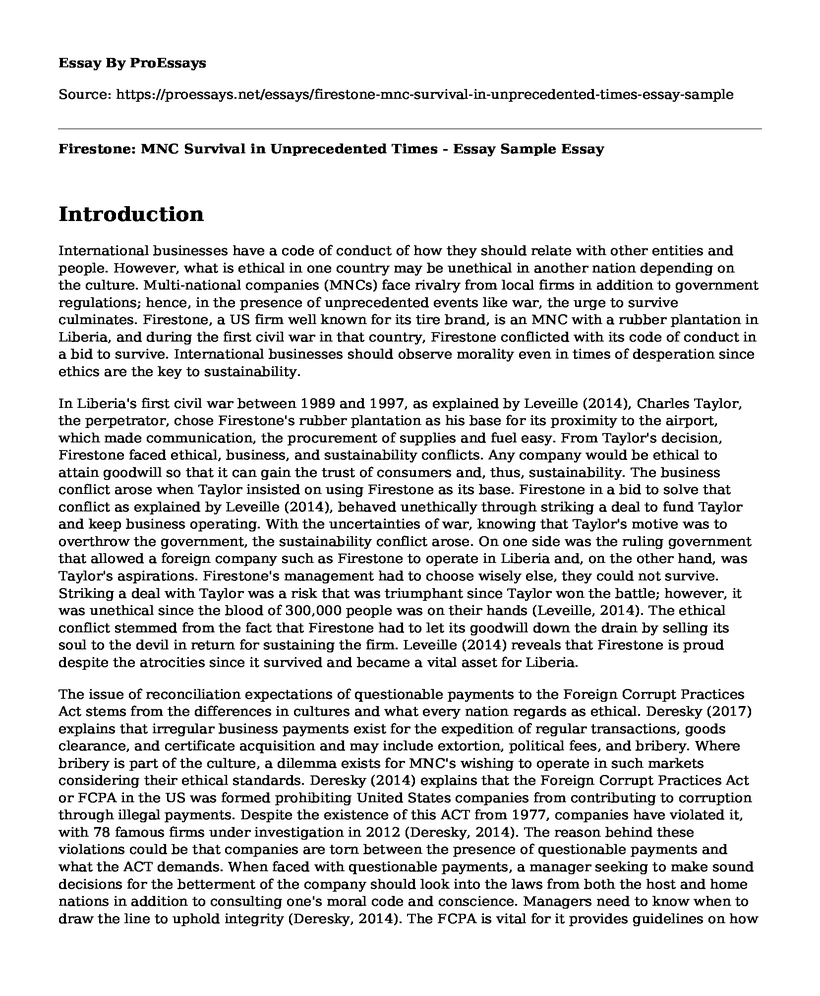Introduction
International businesses have a code of conduct of how they should relate with other entities and people. However, what is ethical in one country may be unethical in another nation depending on the culture. Multi-national companies (MNCs) face rivalry from local firms in addition to government regulations; hence, in the presence of unprecedented events like war, the urge to survive culminates. Firestone, a US firm well known for its tire brand, is an MNC with a rubber plantation in Liberia, and during the first civil war in that country, Firestone conflicted with its code of conduct in a bid to survive. International businesses should observe morality even in times of desperation since ethics are the key to sustainability.
In Liberia's first civil war between 1989 and 1997, as explained by Leveille (2014), Charles Taylor, the perpetrator, chose Firestone's rubber plantation as his base for its proximity to the airport, which made communication, the procurement of supplies and fuel easy. From Taylor's decision, Firestone faced ethical, business, and sustainability conflicts. Any company would be ethical to attain goodwill so that it can gain the trust of consumers and, thus, sustainability. The business conflict arose when Taylor insisted on using Firestone as its base. Firestone in a bid to solve that conflict as explained by Leveille (2014), behaved unethically through striking a deal to fund Taylor and keep business operating. With the uncertainties of war, knowing that Taylor's motive was to overthrow the government, the sustainability conflict arose. On one side was the ruling government that allowed a foreign company such as Firestone to operate in Liberia and, on the other hand, was Taylor's aspirations. Firestone's management had to choose wisely else, they could not survive. Striking a deal with Taylor was a risk that was triumphant since Taylor won the battle; however, it was unethical since the blood of 300,000 people was on their hands (Leveille, 2014). The ethical conflict stemmed from the fact that Firestone had to let its goodwill down the drain by selling its soul to the devil in return for sustaining the firm. Leveille (2014) reveals that Firestone is proud despite the atrocities since it survived and became a vital asset for Liberia.
The issue of reconciliation expectations of questionable payments to the Foreign Corrupt Practices Act stems from the differences in cultures and what every nation regards as ethical. Deresky (2017) explains that irregular business payments exist for the expedition of regular transactions, goods clearance, and certificate acquisition and may include extortion, political fees, and bribery. Where bribery is part of the culture, a dilemma exists for MNC's wishing to operate in such markets considering their ethical standards. Deresky (2014) explains that the Foreign Corrupt Practices Act or FCPA in the US was formed prohibiting United States companies from contributing to corruption through illegal payments. Despite the existence of this ACT from 1977, companies have violated it, with 78 famous firms under investigation in 2012 (Deresky, 2014). The reason behind these violations could be that companies are torn between the presence of questionable payments and what the ACT demands. When faced with questionable payments, a manager seeking to make sound decisions for the betterment of the company should look into the laws from both the host and home nations in addition to consulting one's moral code and conscience. Managers need to know when to draw the line to uphold integrity (Deresky, 2014). The FCPA is vital for it provides guidelines on how to avoid offering gifts, political, and other illegal payments to influence business deals.
Conclusion
In conclusion, International businesses should observe morality even in times of desperation since ethics are the key to sustainability. In the presence of questionable payments, US firms should consult the FCPA for guidance just as Firestone should have done. There is always an alternative; hence, survival should not be an excuse to commit a crime.
References
Deresky, H.(2017). International management: Managing across borders and cultures: text and cases (9th ed).Pearson: Boston.
Leveille, D. (2014). A new investigation into Firestone's rubber plantation sheds light on Liberia's civil war. The World. https://www.pri.org/stories/2014-11-18/new-investigation-firestones-rubber-plantation-sheds-light-liberias-civil-war
Cite this page
Firestone: MNC Survival in Unprecedented Times - Essay Sample. (2023, Aug 12). Retrieved from https://proessays.net/essays/firestone-mnc-survival-in-unprecedented-times-essay-sample
If you are the original author of this essay and no longer wish to have it published on the ProEssays website, please click below to request its removal:
- From Baby Steps to Olympic Strides: Personal Essay About Success
- Business Law: Small Claims Case Paper Example
- Investing in IBM Company Paper Example
- International Business Negotiation Paper Example
- Essay Sample on Recruiting Qualified Candidates for Hotel to Thrive in Spain
- Free Essay Sample on Ethical Compliance: Benefits for Companies and Society
- Report Example on Social Entrepreneurship







